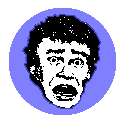By all rights, this book should not exist. It goes against everything the shapers of U.S. drug policy have worked for and achieved. Its prequel, PIHKAL (Phenethylamines I Have Known And Loved), already got the authors in trouble with the DEA. Yet here is volume II, chock full of new information on the synthesis, phenomenology, and philosophy of mind-altering chemicals. What cynical criminal minds could lie behind such a mockery of American values?
The answer is not at all what you might expect. There are the Shulgins now, on the back cover: a couple in their 60’s, with loving eyes touched by joys and sadness. They don’t LOOK like “twisted drug predators” (Steve Forbes’ depiction of supporters of a Washington D.C. medical marijuana bill). Turns out Dr. Shulgin is a well-respected chemist, with a license from the DEA to handle and synthesize scheduled substances. In the succint and sincere essay, “Why I Do What I Do”, he lays down the reasons why he systematically creates and tests (on himself and others) substances which have a particular potential to affect human consciousness. One senses both a rigorous scientific spirit, combined with a sense of urgent humanism, and, above all, a deep love for his work. His research forms the second half, the ‘meat’, of the book, wherein are listed chemical recipes and structural information on various tryptamine compounds, as well as phenomenological reports. This is the part that raises flags in Washington — detailed instructions for synthesizing powerful psychoactive compounds.
The first part of the book consists of essays by Ann and ‘Sasha’, and here Ann takes her chance to shine as a writer, as an observer of human experience. Over half of the articles are hers, in which she shares personal accounts of adventures the two of them have had over the years. Though psychedelics are usually involved in some way, these are not tales for the chemist. She describes the investigation of their home in the wake of PIHKAL‘s publication, and other learning experiences. Most significant, perhaps, is her detailed description of her two years conducting psychotherapy with the aid of MDMA (‘Ecstasy’). This is challenging evidence for anyone who may be unaware of the amazing potential of psychoactives in a therapeutic context. Her recollection of detail throughout these accounts is impressive and realistic.
This is a mighty book. It feels warm with the research and hard work which gave it birth, and with the love and conviction which motivated it. [Berkeley: Transform Press]
